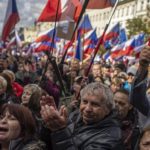- Hans Weber
- December 18, 2024
PUTIN’S ENERGY WAR FUELS FEAR AND EXTREMISM ON CZECH STREETS
Either way, the country was shaken on September 3 as 70,000 turned out at protests called by a ragtag of organisers under the banner “Czech First!”. Speakers on stage at a similar rally on Wednesday led chants for the centre-right, pro-Western government to resign and demanded talks with Moscow to try to secure cheap gas supplies, as organisers from the political fringe continued their efforts to stir up political instability. Police estimated the numbers of protestors in the “lower tens of thousands”, compared with 70,000 who turned out on September 3.
This is Moscow’s script in live action, say analysts. The Kremlin has long sought to sow discord within the EU, and amid the war in Ukraine it’s using energy warfare to try to accelerate the process.
The states of Central and Eastern Europe are among the most vulnerable to this strategy simply because they’re the most heavily dependent on the oil and gas supplies that Russia is limiting.
That has Czech households struggling as electricity and gas bills soar. Some companies complain that their energy costs have risen by 2,000 per cent compared with a year ago. Concern is growing that the winter could see energy shortages, and the main question is just how deep a recession is on the way.
“While Russia is attacking Ukraine with weapons, it is using energy price manipulation against the rest of Europe,” Prime Minister Petr Fiala warned in a national address on September 18. ”Its goal is to threaten the social security of the inhabitants of European countries, subvert their economies, undermine citizen’s trust in the state and democracy, and pit European countries against one another.”
It’s a strategy with strong potential. The number of Czech households below the poverty line or at risk of slipping beneath it has expanded significantly in 2022 as the rise in energy costs has helped push inflation above 15 per cent. And while Fiala plays the wartime leader, his centre-right government has been heavily criticised for failing to reassure citizens that they won’t be allowed to fall into penury.
Hence, vulnerable households are wondering as winter approaches whether they’ll be forced to choose between heating their homes or feeding their families.
“I have small children and I don’t earn enough to keep up with these crazy prices,” Petr from Karlovy Vary, the capital of Czechia’s most economically-deprived region that sits 112 kilometres west of Prague, told BIRN as he listened to speeches on Wenceslas Square on September 28.

Extremists and scammers
Yet while it’s little wonder that anger and anxiety have risen alongside energy bills, the demonstrations have been far from straightforward cries for help.
The demands made by the organisers, a motley collection of fringe political parties and figures from Czechia’s disinformation scene, also add up to the Czech Republic abandoning its pro-Western orientation and supporting key Kremlin propaganda points.
The government has sought to focus on this brash extremist agenda to try to limit the damage. Fiala was quick to point his finger at the pro-Russian organisers and supporters, which include extremist and anti-system parties ranging from the radical right to neo-Nazis and on to the communist KSCM, which in October failed to enter parliament for the first time since it was ejected from power in 1989.
Other reports, meanwhile, suggest that some of the main figures are simply scam artists, who – having learned during the pandemic how to turn populism into cash – have jumped from an anti-vax to a pro-Russian agenda.
But the sheer numbers attending the protests suggests that they are drawing a wider cross section of society. However, it’s tricky to pin down who exactly was in the crowd.
“The government has no idea who was out on the street,” says investigative journalist Lukas Valasek. “There’s no research at all. That’s a key part of the problem.”
Despite the lack of data, however, many are convinced that a good proportion of the protestors are turning up in support not for any extremist agenda, just fears over living standards.
The majority “are not asking for the Czechia to become Moscow’s fifth column,” proclaims columnist Martin Fendrych.
Rather, it’s thought that many want Fiala and his allies to listen to their worries as they eye an uncertain future.
“There are pro-Russian and anti-EU cohorts at the protests, but I believe many are just scared and frustrated people that feel a lack of communication with the political elite,” says Otto Eibl, a political scientist at Brno’s Masaryk University.
Comments sent to Valasek following his expose of the organisers suggest that some of those attending the protests have the same suspicion. One insisted that “except perhaps for the Stalinist Skala [the KSCM’s presidential candidate], I did not notice any bowing to the Putinites in Russia.”
Others insist that many of those turning up for the first protest didn’t even know they could be supporting extremism.
“We don’t have much data, but we know that some were unaware that the protest would have pro-Russian sentiments,” says Martin Buchtík, a sociologist and director of the STEM research institute. “The invitations talked only about calling on the government to deal with the cost-of-living crisis.”
But some protestors suggested that they decided to attend regardless of the intentions of the organisers, as it was the only way to try to make their voice heard.
“I don’t care if they’re modern-day commies or just people and entrepreneurs,” said one. “What else can we do but take to the streets, I already experienced it in ’68, ’89 and now.”
“This is not about whether someone is pro-Russian or pro-American, that was not discussed here at all,“ Lubomir was quoted by Seznam Zpravy as saying the protest. “This is about energy and the Czech government.”

Jolt to the coalition
The extremist agenda – or at least the leadership of anti-system rivals – has, however, spooked Czechia’s parliamentary opposition parties.
The centrist and populist ANO and far-right SPD have both sat on the sidelines trying to find a route to capitalise on the demonstrations without becoming directly involved.
But they clearly hope that the cost-of-living crisis will give fresh impetus to their longstanding claims that Fiala’s government is neglecting Czechs while handing billions of crowns to the 300,000 or so Ukrainian refugees that the country has taken in.
“Today’s number-one topic among the public is no longer the war in Ukraine, but the increase in prices,” says STEM’s Buchtik, referring to new research from his organisation.
At the same time, the hopes of ANO leader and former prime minister Andrej Babis that this would turn recent municipal and Senate elections into a “a referendum on the government” all but flopped, as the five parties of the coalition either limited their losses or even gained votes in some areas.
Key to that was the jolt that the first protest gave the government. After months of prevarication driven by ideological commitment to fiscal prudence and free market principles, it took barely a week for Fiala to announce a plan to cap energy prices for households, with a scheme to help industry following swiftly after.
“Without the announcement of the energy price cap the elections would have been a slaughter!” Eibl exclaims.
But while the move may have staved off disaster for now, pundits of all stripes insist that Fiala must remain wary. “The government needs to take steps to calm down those people that are vulnerable and afraid. The energy cap was key, and we need to understand better the motivation of the crowd – rather than the organisers,” states Eibl.
That understanding is key, because it’s likely that a sizeable chunk of the protesting crowd is part of the million or so voters that are unrepresented in this parliament, after the fringe parties they voted for last October failed to cross the 5 per cent threshold to enter.
This angry cohort, who sociologist Jan Herzmann says “do not trust anyone or anything and listen to various conspiracy theories and fake news”, is perhaps the largest camp in Czech politics.
As across Europe, this fundamental breakdown of communication is helping divisions to grow between Czechia’s wealthier urban population and those that are poorer and live in rural or former-industrial areas.
And it runs both ways. “These are people that feel abandoned and are highly vulnerable to disinformation networks,” says Eibl. “They don’t believe anything in the mainstream media.”
But there was also widespread shock at the size of the crowd that turned out on September 3. Without access to the chain emails and alternative media networks that organisers used, Valasek says he had expected no more than around 1,000 to march. “The media sits in Prague and tends to ignore these million or so people,” he admits.
Buchtik says that with the cost-of-living crisis exacerbating the situation, he expects the protests to continue, and that there’s a worry radical groups may now have the space to grow to the point they could significantly divide society and disrupt Czech democracy.
That appears to leave the ball in the government’s court. And following the narrow escape of the governing parties in September’s municipal and Senate elections, Fiala asserts that his government knows it can’t afford to repeat the mistake of failing to acknowledge the realities of life for those most vulnerable to the economic shocks currently shaking the country.
“This is a trend that we must not underestimate,” he asserted, before suggesting it means the government “must convince people all the more that the real solution to their problems is not populist cries, but sensible politics.”
For many of those rallying on the streets in September, that’s likely to sound less like a pledge that the government will not let them fall, than a demand that they understand his reality.
Recent posts
See AllPrague Forum Membership
Join us
Be part of building bridges and channels to engage all the international key voices and decision makers living in the Czech Republic.
Become a member